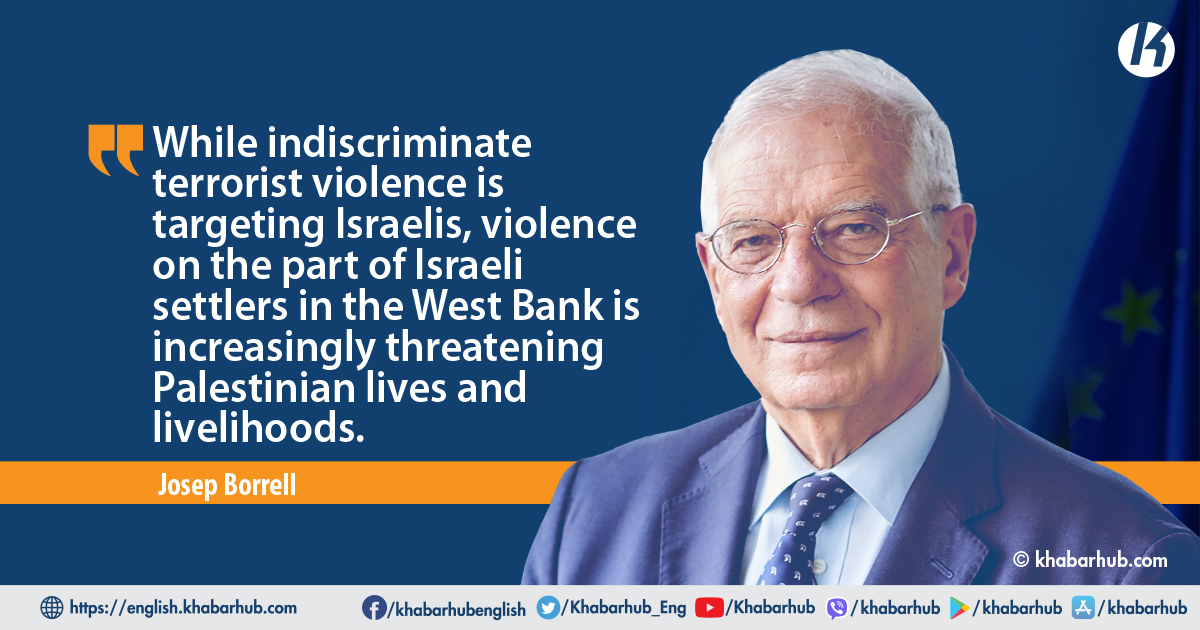Too many people are dying every week in Israel and the occupied Palestinian territories, and millions are living in fear and hopelessness.
The world’s response has been characterized by too many statements and too little action. That must change. We in the European Union and the wider international community need to do more.
We know that people around the world expect us to work for peace, justice, and international law everywhere. But to act successfully, we first must be honest with each other and ourselves.
Being honest means acknowledging that extremism is rising on both sides. Indiscriminate attacks and violence are taking many Israeli lives.
Violence on the part of Israeli settlers in the West Bank is increasingly threatening Palestinian lives and livelihoods – almost always with impunity.
Moreover, Israeli military operations frequently cause civilian Palestinian deaths, often without effective accountability; illegal settlements are expanding on occupied land; and the delicate status quo concerning Holy Sites is eroding.
Our American friends have long tried to help bring the parties together, and the recent normalization agreements (the Abraham Accords) between Israel and some of its Arab neighbors did make an important contribution to regional stability.
While Israelis can rely on a strong state and army, Palestinians have no such recourse. This vast inequality in the ability to control one’s destiny is visible at every roadside checkpoint. All these facts are obstacles to peace.
To be sure, different actors within Europe often react differently to events in the region. But this does not prevent the EU from acting.
We have all been alarmed by recent developments, and we all share the same ultimate goal: to see a safe, secure, globally recognized state of Israel live in peace alongside a safe, secure, globally recognized state of Palestine.
This solution would allow both sides to enjoy freedom, prosperity, and peaceful relations with their neighbors.
Our own interests are also at stake. We want peace because ending the conflict would be much better for international security.
We want peace because we acknowledge the right of both Israel and Palestine to exist, and because we stand for the principle of international law everywhere.
We want peace because we share ties with all peoples in the Holy Land, and because it would benefit regional stability and prosperity. And we want peace because terrorism is a threat everywhere.
But while the EU, the Palestinian Authority, and a sizable part of the Israeli public support the two-state solution, Hamas does not recognize Israel’s right to exist, and the current Israeli government’s coalition agreement denies the Palestinians’ right to their own state. Indeed, the Israeli right increasingly denies that the occupation even exists.
Clearly, neither the Israeli nor the Palestinian side is ready for peace. On the Palestinian side, there is a lack of unity, as well as insufficient democratic legitimacy.
All Palestinian factions will need to renounce terrorism and overcome their political divisions. On the Israeli side, the top priorities must be to stop settlement building and settler violence, and to offer to negotiate an independent Palestinian state.
In recent years, the international community has failed to pursue substantive peace efforts between the parties.
This process is about sketching out how Israel and Palestine will be integrated in the region if they make peace. We need to consider the kinds of security, political, and economic cooperation that peace would make possible, and how all parties can address common challenges relating to water, energy, infrastructure, and climate change.
Our American friends have long tried to help bring the parties together, and the recent normalization agreements (the Abraham Accords) between Israel and some of its Arab neighbors did make an important contribution to regional stability.
But they did not bring Israeli-Palestinian peace any closer. While the United States remains essential for the process, we can no longer leave most of the hard work to American diplomats. Rather, we need a genuinely collective effort that includes Arab states, Europe, the US, and others.
With this honest airing of the facts, what should we do next? Above all, we need more intensive international efforts to create a new peace dynamic. While we cannot force the parties to the negotiating table, we can prepare the way and help them get ready.
In 2013, the EU offered an “unprecedented package of security, economic, and political support” if the parties were to reach a peace agreement.
With this in mind, I instructed EU Special Representative Sven Koopmans to work with the European Commission and EU member states to flesh out such a proposal.
I also asked him to develop (together with our partners) concrete proposals for a comprehensive regional process to achieve peace both between Israel and Palestine and between Israel and all its Arab neighbors.
Then, in February, I met with Saudi Arabia’s foreign minister, Prince Faisal bin Farhan al-Saud, and Arab League Secretary-General Ahmed Aboul Gheit, who agreed to revive and build on the 2002 Arab Peace Initiative and add the European peace package to it. In this effort, we will be working closely with other Arab and international partners.
We can bring that day closer by painting a clearer picture of what regional peace would look like. Honesty requires seeing that we cannot afford to wait any longer.
This process is about sketching out how Israel and Palestine will be integrated in the region if they make peace. We need to consider the kinds of security, political, and economic cooperation that peace would make possible, and how all parties can address common challenges relating to water, energy, infrastructure, and climate change.
This is a moment for exploring what we can all contribute to Israeli-Palestinian peace once it comes. Obviously, neither Europe’s nor anyone else’s contributions would be implemented unless there is an Israeli-Palestinian peace agreement, and we should not assume that our promises of support will be sufficient to bring about that outcome.
Still, something is needed to stop the current downward cycle of violence, and we can play a crucial role in helping the parties to think through their options.
To be clear, I am not announcing a European peace initiative. At this stage, we are simply reaching out to others and considering how we can prepare for the day when Israelis and Palestinians are ready.
We can bring that day closer by painting a clearer picture of what regional peace would look like. Honesty requires seeing that we cannot afford to wait any longer.
(Josep Borrell, High Representative of the European Union for Foreign Affairs and Security Policy, is Vice President of the European Commission for a Stronger Europe in the World)
Copyright: Project Syndicate









Comment